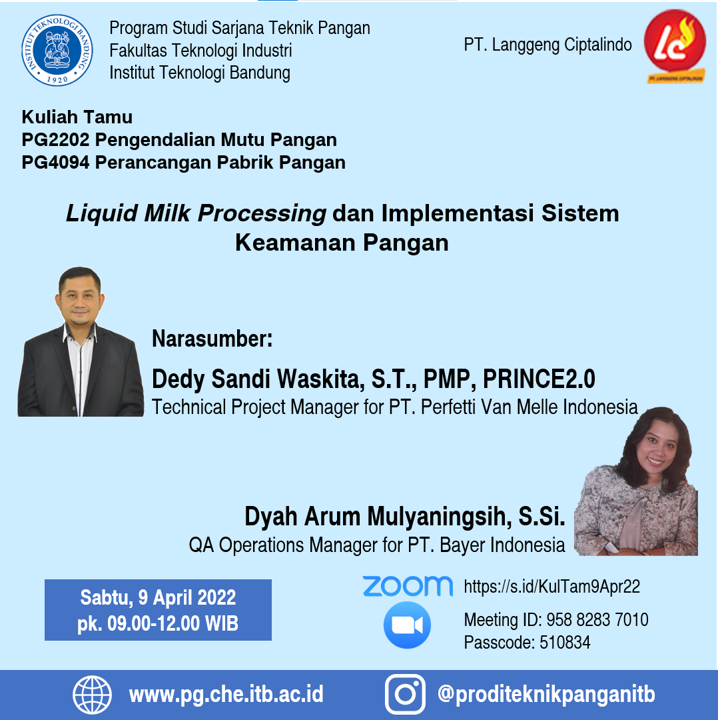[:id]

BANDUNG, itb.ac.id – Kualitas dan mutu dari produk pangan merupakan hal yang sangat penting untuk dikontrol dan dipersiapkan oleh sebuah perusahaan makanan, karena makanan merupakan hal yang bersentuhan langsung dengan tubuh manusia serta dapat memberikan efek yang signifikan terhadap tubuh manusia. Maka dari itu, proses pengendalian mutu pangan pada industri makanan perlu mendapat perhatian besar terutama terhadap karyawan.
Program studi Teknik Pangan, Fakultas Teknologi Industri, Institut Teknologi Bandung berkolaborasi dengan PT Langgeng Ciptalindo dalam pertemuan kuliah tamu untuk mata kuliah PG2202 Pengendalian Mutu Pangan pada Sabtu (9/4/2022). Narasumber yang membawakan materi adalah QA Operations Manager PT Bayer Indonesia, Dyah Arum Mulyaningsih, S.Si.
Dyah mengatakan, hal pertama yang harus dipenuhi terkait kebersihan dalam pengendalian mutu pangan adalah hygiene dan alur personel. “Alur personel wajib dibedakan dengan alur barang untuk mencegah cross contamination. Selain itu, para pekerja juga wajib mengenakan pakaian yang sesuai, bersih, dan bebas dari sobekan yang akan berisiko mengkontaminasi makanan jika sobekan benang jatuh. Pakaian kerja juga tidak boleh kancing dan kantong luar,” terang Dyah.
Hal lain yang perlu dijamin oleh pekerja juga adalah rambut, keringat, dan komponen lain dari tubuh pekerja tidak ada yang terjatuh ke dalam produk. Penggunaan sepatu tertutup, sarung tangan, dan hair net juga perlu digunakan agar produk tidak terkontaminasi rambut, kotoran tangan, dan komponen lain dari para pekerja. Selain faktor eksternal, faktor internal dari para pekerja juga memiliki aturan khusus dalam industri pangan.
“Jika ada karyawan yang sakit, wajib melaporkan kondisi kesehatan mereka. Terutama untuk penderita penyakit kuning, diare, muntah, demam, sakit tenggorokan, kulit terinfeksi, hingga sakit mata, telinga, dan hidung. Jika terinfeksi, karyawan tidak diperbolehkan menangani bahan makanan hingga sembuh,” papar Dyah.
Hal lain dari sisi internal karyawan yang tidak boleh dilakukan saat bekerja adalah bersin dan batuk di dekat produk, meludah, lupa mencuci tangan, dan tidak menjaga kebersihan kuku. “Merokok, makan, mengunyah, menggunakan perhiasan, menggunakan cat kuku, menggunakan kuku palsu, menggunakan tindik dan bulu mata palsu juga tidak diperkenankan saat bekerja,” tegas Dyah.
Dyah juga menjelaskan salah satu metode paling umum pada proses pengendalian mutu pangan yaitu Hazard Analysis Critical Control Point (HACCP). Hazard atau kontaminan dalam produk pangan terbagi kedalam tiga kategori yaitu bahaya biologis, fisik, dan kimia. “Identifikasi bahaya harus dilakukan berdasarkan data dan informasi scientific, referensi, karakteristik produk, flow produk, dan faktor penunjang lainnya seperti alat dan bangunan,” papar Dyah.
Penentuan batas kritis dari setiap critical control point harus ditetapkan untuk setiap CCP, harus terukur, terdokumentasi, rasional, dan harus ada prosedur, spesifikasi, dan pelatihan. Setelah melakukan identifikasi bahaya, tahap selanjutnya yang harus dilakukan adalah evaluasi yang merumuskan terkait severity, probability, dan detectability dari bahaya yang teridentifikasi. Terakhir, dilakukan mitigasi dan CAPA Plan.
Reporter: Yoel Enrico Meiliano (Teknik Pangan, 2020)
[:en]

BANDUNG, itb.ac.id – The quality of food products is very important to be controlled and prepared by a food company, because food is something that is in direct contact with the human body and can have a significant effect on the human body. Therefore, the process of controlling food quality in the food industry needs to get great attention, especially for employees.
Food Engineering Department, Faculty of Industrial Technology, Bandung Institute of Technology collaborated with PT Langgeng Ciptalindo in a guest lecture meeting for the course PG2202 Food Quality Control on Saturday (9/4/2022). The speaker for this topic was the QA Operations Manager of PT Bayer Indonesia, Dyah Arum Mulyaningsih, S.Si.
Dyah said, the first thing that must be met regarding cleanliness in food quality control is hygiene and personnel flow. “The flow of personnel must be distinguished from the flow of goods to prevent cross contamination. In addition, workers are also required to wear clothes that are suitable, clean, and free from rips that will risk contaminating food if torn yarn fall. Clothes while working must also not have buttons and outer pockets,” explained Dyah.
Another thing that workers need to ensure is that hair, sweat, and other components of the worker’s body do not fall into the product. The use of closed shoes, gloves, and hair nets are also needed so that the product is not contaminated with hair, dirt, and other components of the workers. In addition to external factors, internal factors from workers also have special rules in the food industry.
“If there are employees who are sick, they must report their health conditions. Especially for people with jaundice, diarrhea, vomiting, fever, sore throat, infected skin, to sore eyes, ears, and nose. If infected, employees are not allowed to handle foodstuffs until they recover,” said Dyah.
Other things from the internal side of employees that should not be done while working are sneezing and coughing near products, spitting, forgetting to wash their hands, and not keeping their nails clean. “Smoking, eating, chewing, using jewelry, using nail polish, using artificial nails, using piercings and false eyelashes are also not allowed while working,” said Dyah.
Dyah also explained that one of the most common methods of controlling food quality is the Hazard Analysis Critical Control Point (HACCP). Hazards or contaminants in food products are divided into three categories, namely biological, physical, and chemical hazards. “Identification of hazards must be carried out based on scientific data and information, references, product characteristics, product flow, and other supporting factors such as tools and buildings,” said Dyah.
Determination of critical limits of each critical control point must be set for each CCP, must be measurable, documented, rational, and there must be procedures, specifications, and training. After identifying the hazard, the next step that must be carried out is an evaluation that formulates the severity, probability, and detectability of the identified hazard. Finally, mitigation and CAPA Plan are carried out.
Reporter: Yoel Enrico Meiliano (Food Engineering, 2020)
[:]
